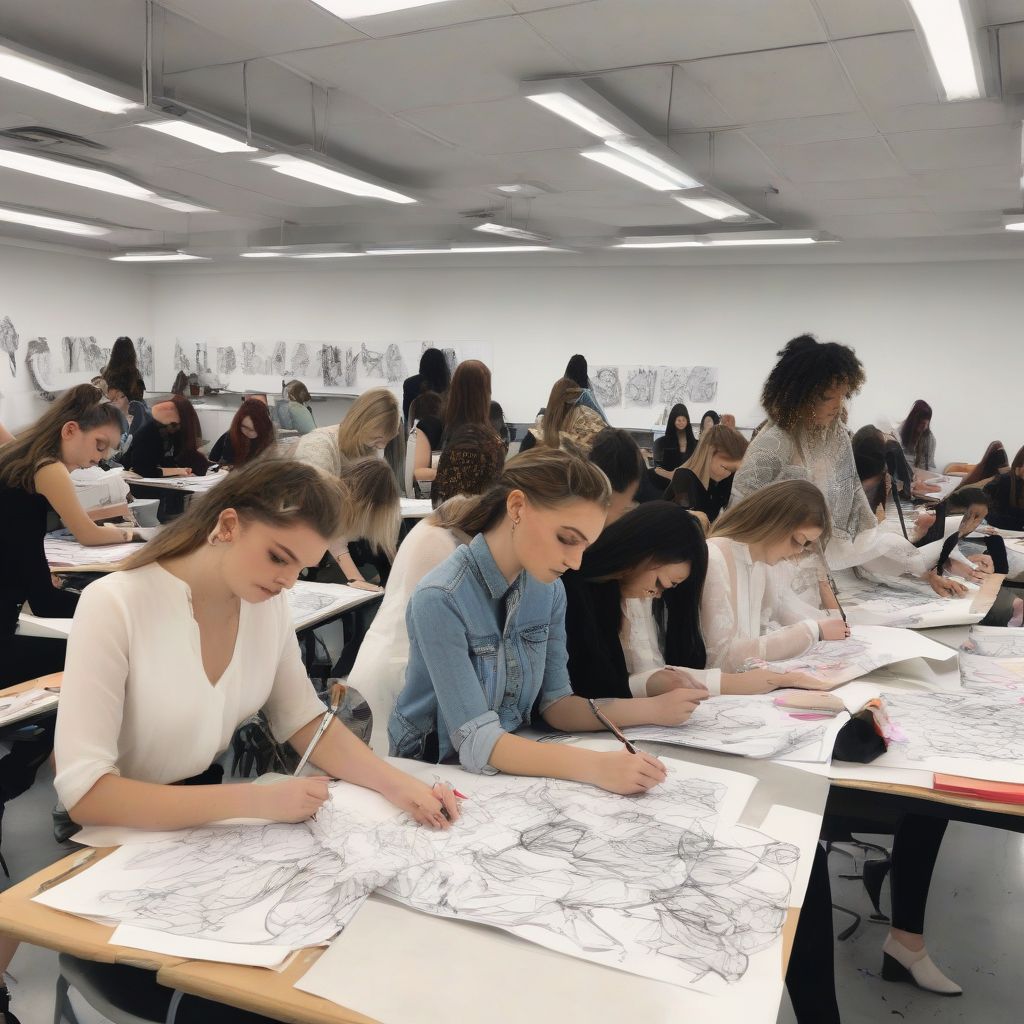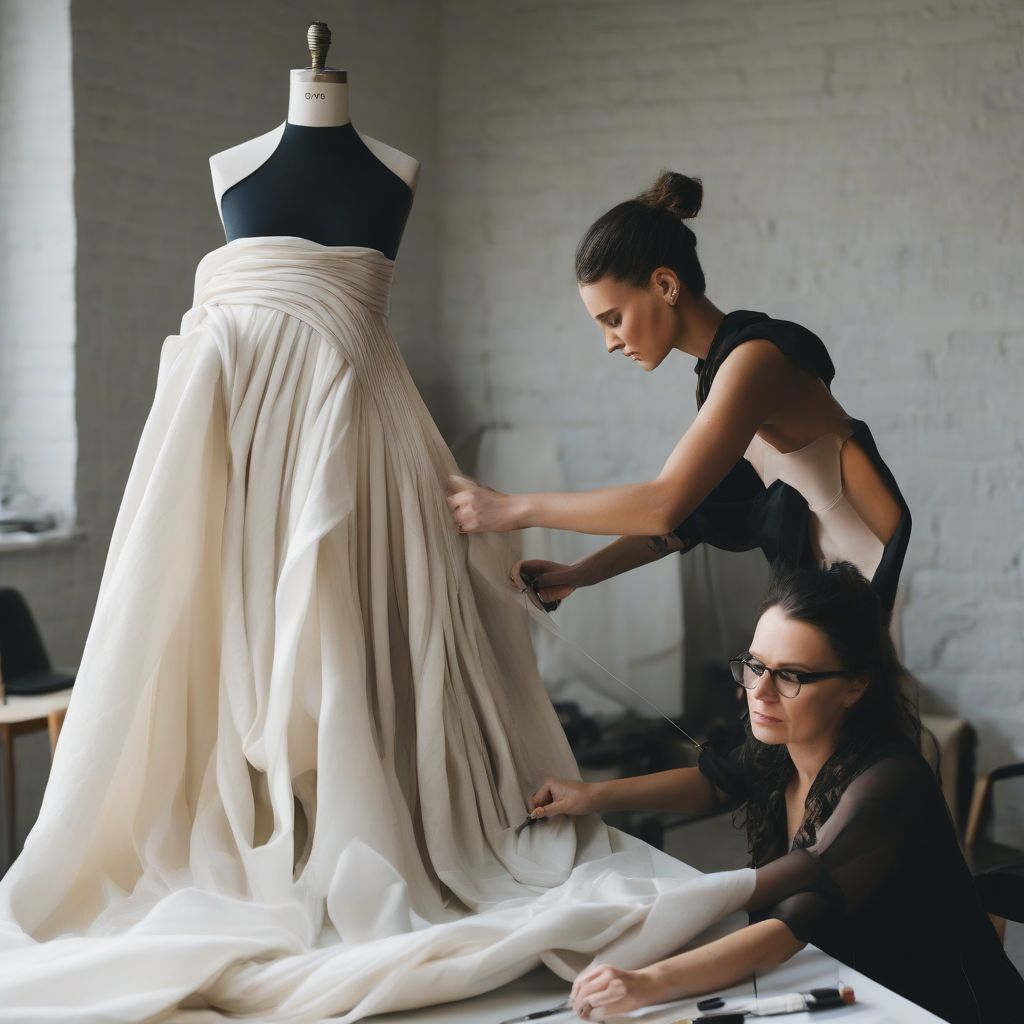Imagine this: you’re dreaming of a world draped in your creations, your designs gracing magazine covers and red carpets. You aspire to be the next Donatella Versace or Virgil Abloh. But is raw talent enough to reach such towering heights in the cutthroat world of fashion, or does formal education pave the runway to success?
The Fabric of Success: Untangling Talent, Education, and Industry Demands
The impact of fashion education on a designer’s career is a multifaceted debate, often sparking passionate discussions within the industry. While some argue that raw talent is the primary driving force, others maintain that a formal education provides the essential tools and knowledge to thrive.
 Fashion Design Students Sketching
Fashion Design Students Sketching
Let’s break down both sides of the argument:
The Case for Raw Talent:
Many iconic designers, like Coco Chanel and Alexander McQueen, achieved phenomenal success without a traditional fashion education. They possessed an innate understanding of aesthetics, construction, and pushing creative boundaries. Their stories highlight the power of inherent talent and a relentless drive to succeed.
- Intrinsic creativity: These individuals possess an inborn ability to envision and translate their ideas into garments that resonate with people.
- Innate business acumen: Many self-taught designers intuitively understand market trends, consumer desires, and possess the entrepreneurial spirit to build their brands.
- Unique perspectives: Lacking formal training can be an asset, fostering originality and fresh perspectives that challenge conventional norms.
The Power of Formal Training:
On the other hand, fashion schools equip aspiring designers with a comprehensive skillset, encompassing technical expertise and theoretical knowledge, often absent in self-taught individuals.
- Technical proficiency: Fashion education imparts essential skills in pattern making, draping, sewing, and garment construction, forming a strong foundation for design execution.
- Industry knowledge: Courses on fashion history, textiles, merchandising, and marketing provide valuable insights into the business side of the industry, fostering well-rounded professionals.
- Networking opportunities: Fashion schools offer invaluable networking opportunities with established designers, potential employers, and fellow students, paving the way for future collaborations and career advancements.
Striking a Balance: The Interplay of Education and Experience
While both raw talent and formal training contribute to a successful design career, the true magic often happens in their interplay.
Real-World Application:
- Many successful designers combine their formal training with internships or apprenticeships. This practical experience bridges the gap between theoretical knowledge and real-world application, providing invaluable hands-on learning.
- For example, Marc Jacobs, after graduating from Parsons School of Design, honed his craft working alongside established designers before launching his own label.
Continuous Learning:
- The fashion industry is dynamic, with trends constantly evolving. Fashion education, therefore, shouldn’t end with a degree.
- Successful designers are lifelong learners, constantly seeking new information, experimenting with techniques, and evolving their aesthetics to remain relevant. They attend workshops, engage in online courses, and stay abreast of industry publications.
The Verdict: A Tailor-Made Approach
Ultimately, there’s no single answer to whether fashion education is essential for success. The path is rarely linear and often varies based on individual circumstances, ambitions, and learning styles.
[amazon bestseller=”fashion design books”]
Factors to Consider:
- Individual Goals: Aspiring designers need to define their ambitions. Do they aspire to launch their own label, work as creative directors, or specialize in a specific niche? Their goals will influence the importance of formal education.
- Learning Style: Some individuals thrive in structured academic environments, while others learn best through hands-on experiences. Understanding one’s learning style is crucial in determining the most suitable path.
- Financial Resources: Fashion education can be expensive. Aspiring designers need to weigh the financial investment against potential returns and explore alternative avenues like apprenticeships or online courses.
Beyond the Catwalk: Cultivating Essential Skills
Irrespective of the chosen path, certain skills are indispensable for success in the fiercely competitive fashion industry.
1. Adaptability and Resilience:
Fashion is a constantly evolving field. Designers need to be adaptable, embracing new technologies, materials, and trends. The ability to bounce back from setbacks, accept criticism, and learn from mistakes is crucial.
2. Business Acumen:
A keen understanding of the business side of fashion is vital. Designers need to be savvy about production costs, pricing strategies, marketing, and branding to build sustainable and profitable businesses.
3. Networking and Communication Skills:
Building strong relationships is crucial in the fashion industry. Designers need to effectively communicate their vision to stakeholders, collaborate with diverse teams, and cultivate relationships with media and buyers.
The Final Stitch: Embracing the Journey
 Fashion Designers Working Together
Fashion Designers Working Together
The journey of a fashion designer is as unique as their creations. Whether self-taught or formally trained, passion, perseverance, and a constant hunger for learning are the threads that weave a successful career. Formal education can provide a strong foundation, but ultimately, it’s the designer’s individual talent, hard work, and business acumen that dictates their impact on the world of fashion.
What are your thoughts on the impact of fashion education? Share your perspectives in the comments below! And don’t forget to explore our other articles for more insights into the fascinating world of fashion.
